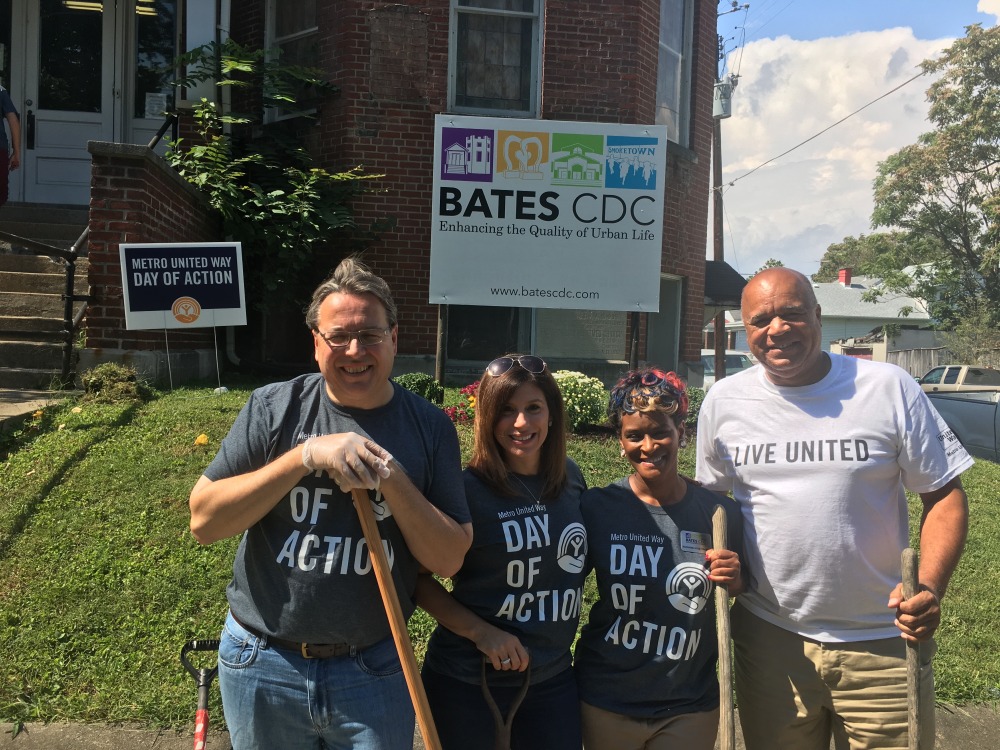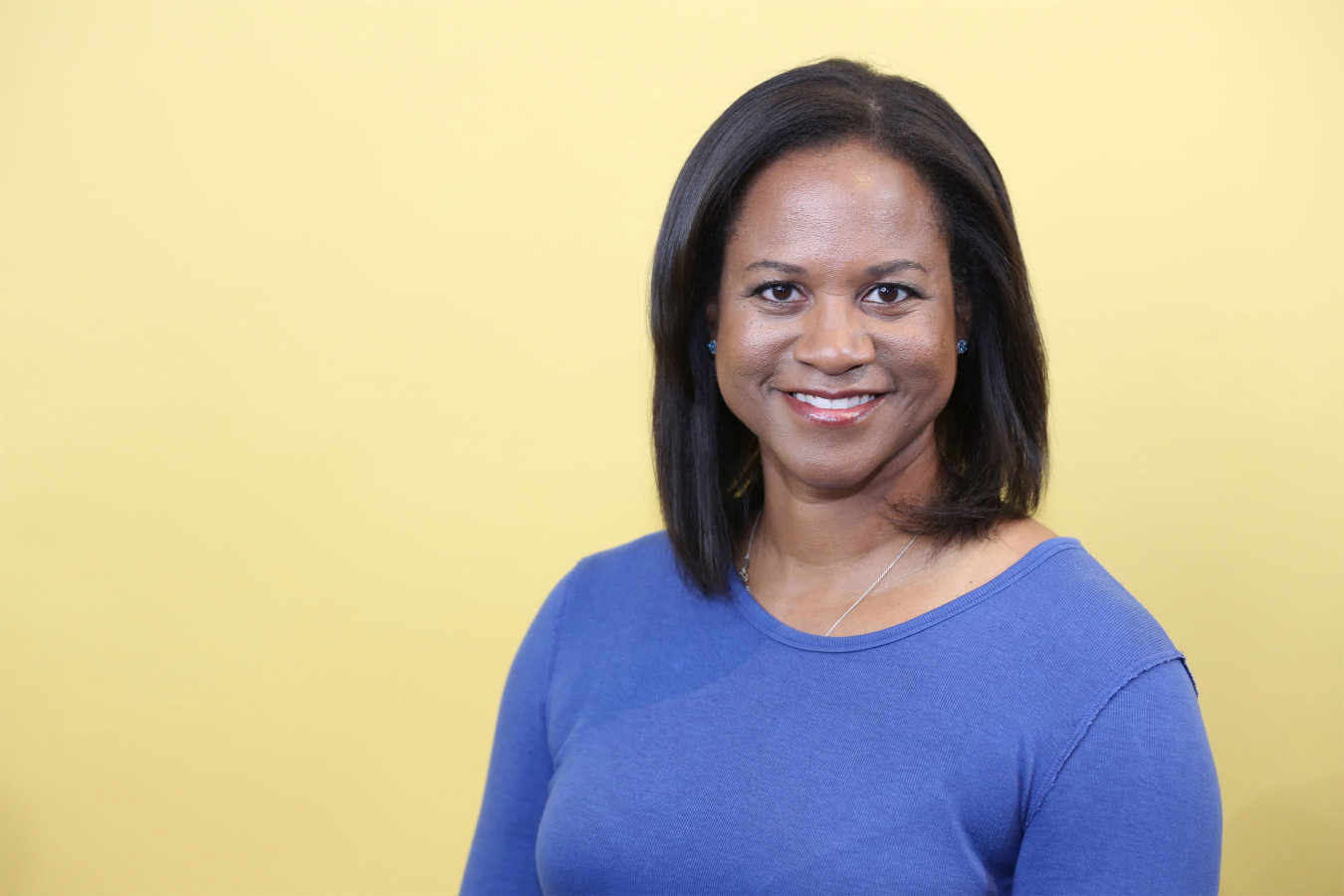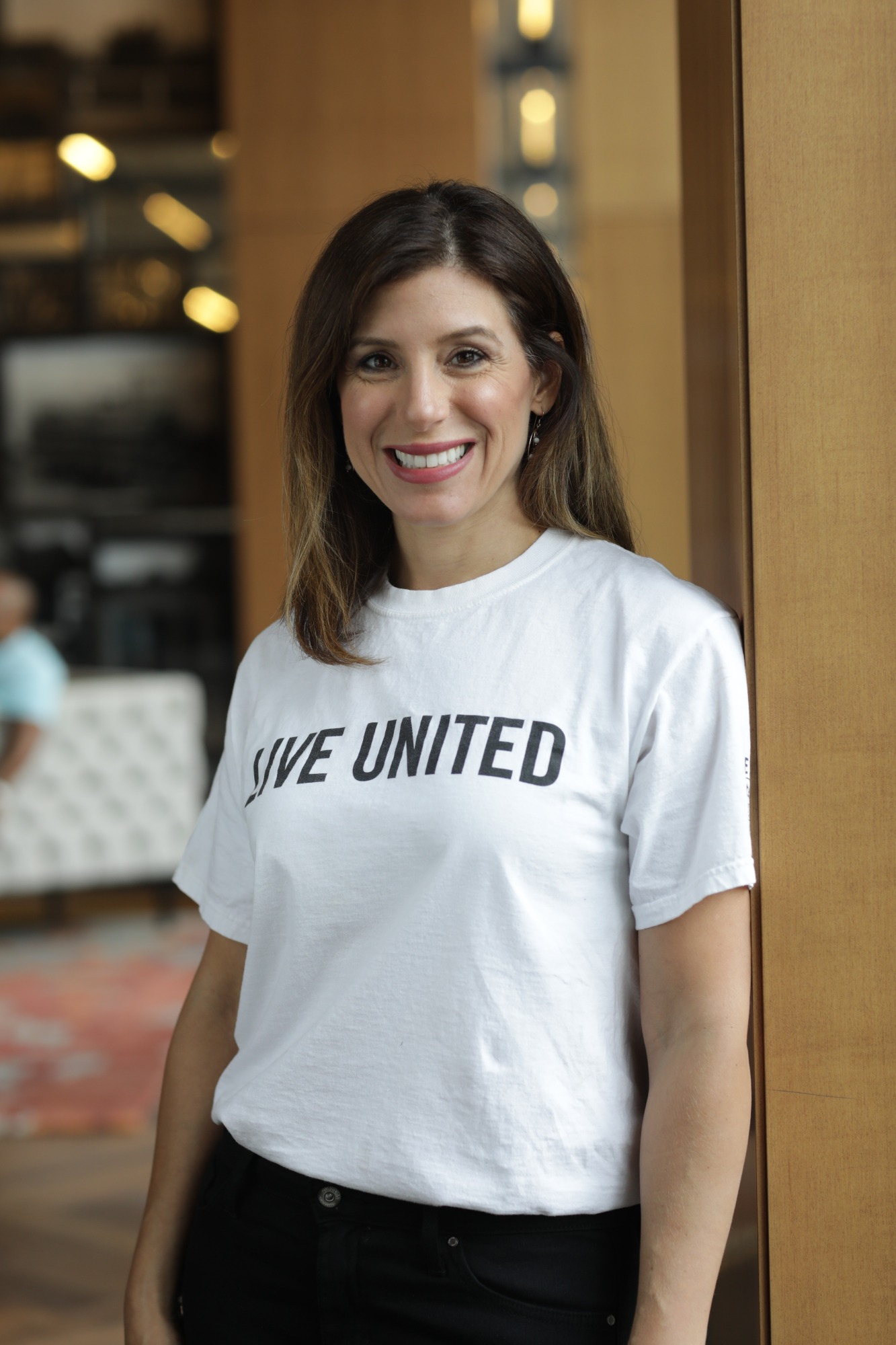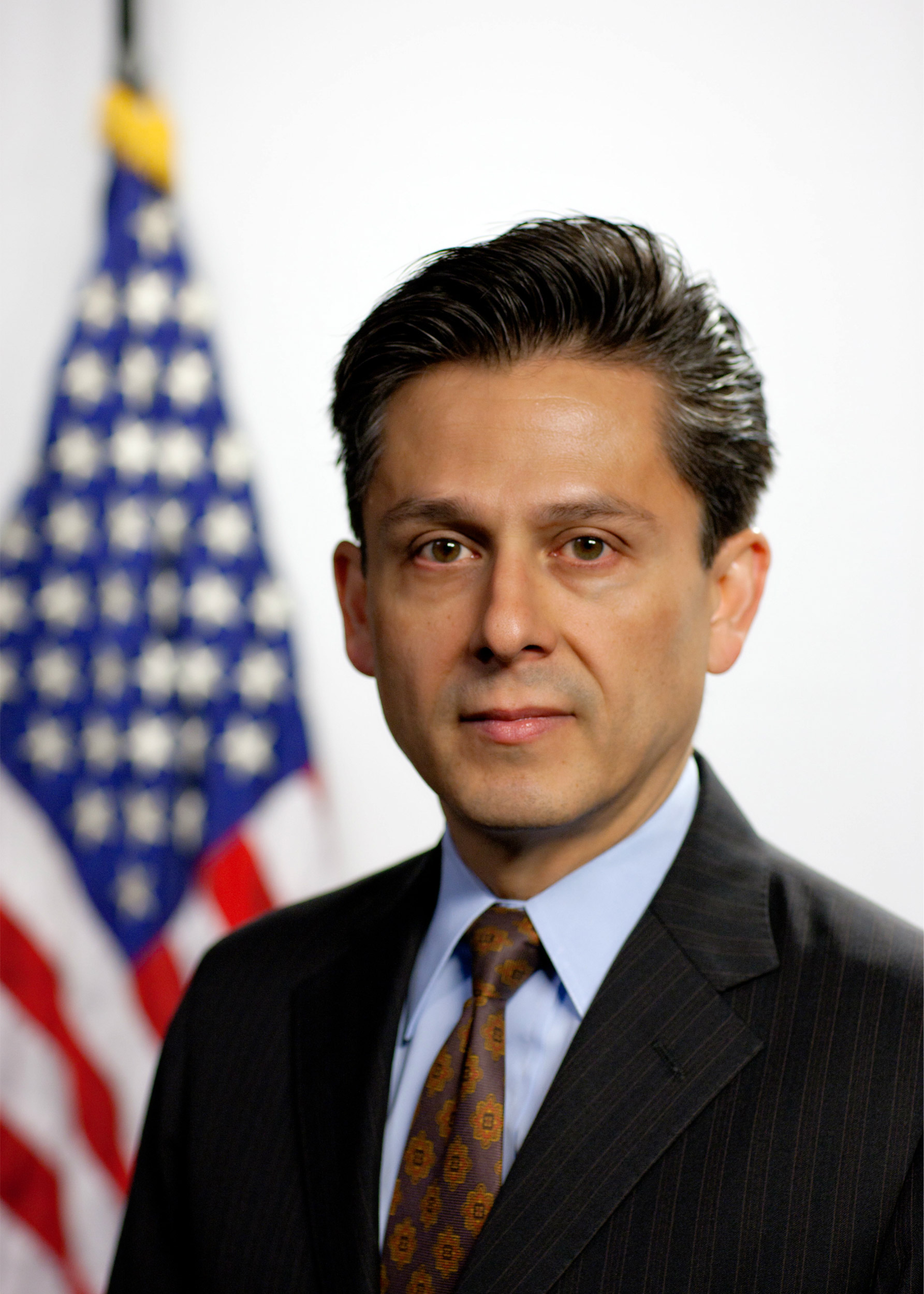
“There are times in my current role [at United Way] where I don’t have all the answers, but I can set a strong direction for my team,” says Theresa Reno-Weber, M.P.P. ’08, who (second from left) is shown with her crew for Metro United Way’s Day of Action in Louisville, Ky.
Courtesy of Metro United Way
Doing the right thing
Alums offer Class of 2020 advice on the value and future of a career giving back to communities
Jose Cerda III ’88, Koma Gandy Fischbein ’95, and Theresa Reno-Weber, M.P.P. ’08, have followed different paths since graduating, but they have one important thing in common: the drive to give back to their communities. Cerda is a former special assistant for domestic policy under President Bill Clinton and deputy assistant to President Barack Obama, J.D. ’91, and vice president of public policy for IFF, a nonprofit community-development financial institution in Chicago. Gandy Fischbein is a decorated veteran of the U.S. Navy and director of curriculum production at Codecademy, a New York–based education company. Reno-Weber is a former U.S. Coast Guard lieutenant who is currently president and CEO of Metro United Way in Louisville, Ky. They spoke to the Gazette to reflect on their journeys and offer advice for the Class of 2020 as it prepares for the future amid the current upheaval.
Q&A
Jose Cerda III ’88, Koma Gandy Fischbein ’95, and Theresa Reno-Weber, M.P.P. ’08
GAZETTE: Where did your path to public service begin? What sparked your passion?
THERESA RENO-WEBER: My father, uncles, and both of my grandfathers all served in the military. They were driven to support and protect the country that had given our family so much as immigrants from Sicily and Italy, and their conviction left a deep impression on me. In addition to this, my experience as a Girl Scout also inspired me to always leave a place better than I found it. My troop was involved in many community volunteer projects, and I loved seeing how much an act of service could mean to someone.
JOSE CERDA III: My path started inside a congressional decision-making class [at Harvard] taught by Mark Peterson [then the Henry LaBarre Jayne Associate Professor of Government]. When I handed in my thesis, he said I should go to D.C. and pursue a job on Capitol Hill. This was critical for me to hear. I loved government, but nobody else in my life was nudging me in that direction. As the son of immigrants, my parents expected me to become a doctor or a lawyer. Mark really pushed me to follow my passion. I packed up my belongings, took a train to D.C., and started my job search. It all began with Mark — he sparked my interest in public policy and gave me that push when I was graduating. He’s continued to be a friend and a mentor to me throughout my life.

KOMA GANDY FISCHBEIN: My father is from West Africa and my mother was a teacher in the Philadelphia school system for nearly 40 years. Both inspired me to give back through education. Like many people with parents who immigrated to the United States, there’s an emphasis on education to create more opportunities for yourself and those around you. Since I was small, I’ve always felt deeply that those of us who are privileged have an obligation to help. Whether it’s working with children who have mobility issues with A Leg To Stand On or ensuring equal access to opportunities with the Bronx Arts Ensemble or Play Rugby USA, I will continue helping others as long as I’m able to. I am where I am because of opportunities, and they are not equally distributed. I want to help level the playing field and do something to tip the balance so that others can have the same access.
GAZETTE: Tell me about a time when you faced uncertainty as a recent graduate. What helped you tackle that challenge?
RENO-WEBER: I graduated at 20, entered the Coast Guard, and was immediately responsible for leading a team of 12 people. Several were 30 years my senior and knew more about the work than I did. This experience helped me understand quickly how to defer to the expertise of others, share responsibilities, communicate clearly, and be honest about what you know and what you don’t. It’s essential to work toward a shared goal, understanding that everyone has an important role to play. You can’t do it alone. There are times in my current role [at United Way] where I don’t have all the answers, but I can set a strong direction for my team, leaning on them and trusting them to use their strengths to shine.

CERDA: When I started applying to jobs in Congress, I received 54 rejection letters. I posted them on my wall for motivation, and I’ve kept them to this day. I only had enough money to get me through a few weeks in D.C., and I didn’t know anyone. I found full-time work at night and held an internship during the day until I got my first role on Capitol Hill three months later. When I talk with recent graduates, I’m struck by how so many are focused on finding the “perfect” job right away. If you can, do your best to research who you’re working for. You’ll want to work with someone who shares your values. If you focus too narrowly, you might have a job that looks good on paper but doesn’t make you happy — and you won’t have great people in your life who take an interest in you and help make you better. It’s also valuable to know that the relationships you’ve invested in over four years with your classmates and your professors will carry you forward. I look back now and these things are clear to me, but they weren’t at the time.
GANDY FISCHBEIN: I had no idea what I was getting into when I joined the Navy. As I’m walking up the pier to my first assignment, the gravity of the moment hit me: I’m a 22-year-old black woman with a Harvard degree, and I’m the first — and only — woman to be stationed on this ship. The first six months were incredibly lonely, but I knew that I had a job to do. It was my responsibility to work to the best of my abilities, and I had to keep believing in myself. By the time I left, I was sad to go — I found allies in the most unlikely places. You’ve got to believe in yourself. Believe in what you have to offer and that you have the tools and know-how to get through. It’s OK to feel scared, lonely, and anxious, but you must find a way to harness those feelings, ask for help, and push through.
GAZETTE: What guidance would you share with recent graduates considering a career in public service during these uncertain times?
RENO-WEBER: Seek out new perspectives wherever you can. Do your best to be a lifelong learner and find ways to truly understand — through lived experiences — the world around you. To be a better public servant, you must put yourself in the shoes of the people your decisions will affect the most. When I left the Coast Guard, where I was helping people immediately by rescuing them from the water, I wanted to find a role with a different kind of impact. In the military, I carried out decisions made by others, and that’s where I started to understand that helping to shape policy was another way to make life better for my community. My military service helped me gain confidence that I didn’t have to choose one career for the rest of my life. You don’t have to choose one path — especially in this world right now.

CERDA: When you work in public service — whether you’re at a food bank or in the White House — your career is being made in the moment by the problems you’re solving. Sometimes it’s hard to see, and the path to finding a job may not be as discernable as it once was, but if you’re willing to pick yourself up when you face rejection, there’s a way forward. People who can offer solutions will have great opportunities to do meaningful work that will have a compounding effect over the course of their lives. Leadership matters. This is a point in time where we are all aware of how vital our government and civic sector need to be. I hope the leaders who could change things for the better are emerging from the Class of 2020.
GANDY FISCHBEIN: I think that sometimes in the most adverse circumstances, you can find surprising and hopeful examples of empathy and compassion. Those are things that we all need to hold onto and create. There’s so much pressure to find a linear path to success. You’re always going to be chasing a ghost — an illusion of what success looks like or this idea that you’re defined by how prominent your name is on an organizational chart. Success is dropping off a meal at your neighbor’s door. There is no timeline or definition for your own journey. The sooner you can embrace that, the happier you will be with what you can achieve and create in your own life.
GAZETTE: How can the Class of 2020 be a force for good in the world?
RENO-WEBER: The world we experience today is the result of the decisions and actions of others. This graduating class can create a different world with the actions it takes. Rely on your friends and classmates as you move forward and find ways to stay meaningfully connected in this virtual space. Take the time to build and sustain those relationships now so that you have a strong network to lean on.
CERDA: I believe that just as we came out of World War II and committed ourselves to building institutions that were the basis of prosperity over the next 75 years, we’re going to have to rebuild and rethink our civic organizations with this emerging generation. I hope that, even during these difficult times, recent graduates see that they have the power to change our democracy. When I look at the Class of 2020, I see one of the most prepared and diverse classes to ever walk out of the gates of Harvard Yard. I believe they can restitch the fabric of American society back together and tackle the problems we need to solve. Given the unbelievable education they’ve had and the community they’ve created, I’m hopeful that they can fuse these qualities to become leaders that find the common ground we need.
GANDY FISCHBEIN: I think the first thing is respecting that you’re going to be a work in progress. You cannot do it all by yourself. There are always people who will help you, and you’ll get a lot more accomplished working as part of a team than going it alone. When you don’t have all the answers, recognizing how and when to get help will empower you to confront obstacles. Give yourself space to be in the mess, space to work toward a solution, and trust in your abilities.




